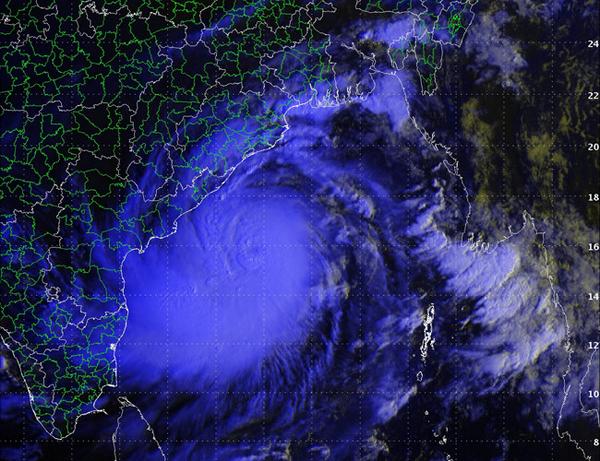
As per the updated information found on the official website of Meteorological Centre, Bhubaneswar, here are the likely impacts of Hudhud cyclone on Odisha.
Cyclone Movement Update
The Very Severe Cyclonic Storm ‘HUDHUD’ over westcentral Bay of Bengal moved westwards during past six hours and lay centered at 0830 hrs IST of 11th October, 2014 near latitude 15.9ºN and longitude 85.4ºE, about 380 km south-southeast of Gopalpur.
The system would move west-northwestwards for some more time. It would then move northwestwards and cross north Andhra Pradesh coast around Visakhapatnam by the forenoon of 12th October 2014.
Wind Warning
Squally wind speed reaching 50-60 kmph gusting to 70 kmph from Northeast direction would prevail along and off Odisha coasts. The wind speed would increase to 80-90 kmph along and off Odisha coast from today evening. Sea condition would be rough to very rough in next 12 hours and thereafter it would be very rough to high along and off Odisha Coast.
Rainfall Warning
Heavy to very heavy rainfall at a few places with extremely heavy rainfall at one or two places over districts of Malkangiri, Koraput, Rayagada, Nawarangpur,Ganjam, Gajpati, Kalahandi and Phulbani of South Odisha in next 48 hours.
Heavy to very heavy rainfall at one or two places in districts of Khurda, Puri, Jagatsinghpur, Nayagarh, Jajpur, Balasore, Bhadrak, Kendrapara, Cuttack, Dhenkanal and Maurbhanj in next 24 hours.
Possible Impacts of Hudhud
There might be breaking of tree branches causing minor damage and communication lines, and uprooting of trees.
Image Courtesy: I Am Bhubaneswar
Here is what you should do before the cyclone
- Check the house; secure loose tiles, carry out repair works for doors and windows
- Remove dead woods or dying trees close to the house; anchor removable objects like lumber piles, loose tin sheds, loose bricks, garbage cans, sign-boards etc. which can fly in strong winds
- Keep some wooden boards ready so that glass windows can be boarded if needed
- Keep a hurricane lantern filled with kerosene, battery operated torches and enough dry cells
- Keep some extra batteries for transistors
- Keep some dry non-perishable food always ready for emergency use.
- Get extra food, which can be eaten without cooking. Store extra drinking water in suitably covered vessels.
- Have hurricane lantern, torches or other emergency lights in working conditions and keep them handy.
- Switch off electrical mains in your house.




What Do You Think?